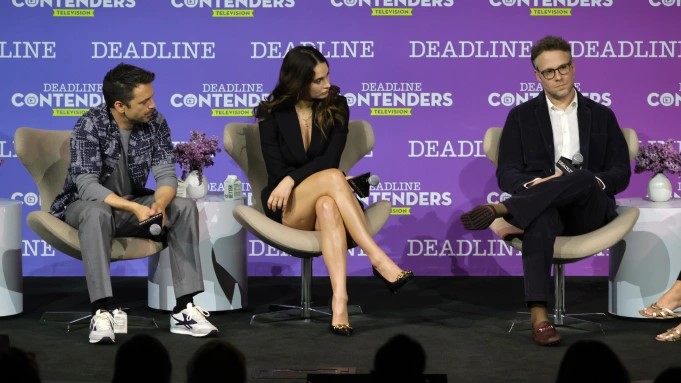LA Times – Lily James and Sebastian Stan find a real relationship at the heart of ‘Pam & Tommy’
Lily James knew of Pamela Anderson only as “the icon from ‘Baywatch’ and Playboy.” Sebastian Stan knew something of Mötley Crüe drummer Tommy Lee‘s reputation for debauchery. But when James and Stan got working on the limited series “Pam & Tommy,” which turns on the infamous sex tape stolen from the couple, the two actors found themselves struck by … innocence.
“There was a certain innocence to them that was in the script,” Stan says, “a lot of it in that initial, comet-like meeting that happened between them that led to three, four days in Mexico and, suddenly, a wedding. There was this instant pull, and it lasted for them. We were both conscious of trying to find that authentic kind of primal attraction, being protective of that and conveying that in the best way we possibly could.”
That high-speed collision of Anderson and Lee is depicted in the second episode. As presented by showrunner and writer Robert Siegel, director Craig Gillespie and the whole creative team, (especially cinematographer Paula Huidobro of “CODA,” editor Tatiana S. Riegel, who worked with Gillespie on “I, Tonya,” and the all-in hair-and-makeup department led by Barry Lee Moe, David Williams and Jason Collins), it’s a wild ride of two people falling head over heels in love — with a not-inconsiderable boost from mind-altering substances. The series doesn’t shy from portraying the couple’s explosive sexuality. It has loads of fun doing so. But as the poet sang, “Only true love can leave beauty innocent.”
Stan says, “We would meet at Craig’s house and he’d be like, ‘We’re gonna do this and all these push-ins, and these are gonna be the songs …’ When I watch that episode, I almost feel like I’m high.”
“High on love, high on drugs, high on everything,” agrees James from a separate Zoom screen. “It felt like them against the world, which felt so intoxicating to watch, and I think even more upsetting to see the world banging down their door.”
The actors’ transformations into the famous couple went viral before the show ever aired, but the stars solemnly attest to their determination to honor Anderson and Lee — and especially their relationship — despite the outsize personalities in the series and its crazy events. Seriously, four days knowing each other, then a beach wedding.
James laughs: “There’s no sense in falling in love!”
The Brit best known for “Downton Abbey” and “Cinderella” clearly enjoys the absurd. When the notion of her in the role came up, she thought, “‘Whoa, me? Pamela Anderson? That’s completely insane.’ I was just shocked I would be in anyone’s mind when it came to casting, and I was hungry for that.”
When she started researching, she was overwhelmed by the abundance of material. But when she found early Anderson interviews, “It would be like gold dust. Although she’d already ridden to huge fame, it’s that word Sebastian used: ‘innocence.’ The newness of her career, of ambition, of a relationship, of love — love feels so important for her energy. I began to see real anchors of behavior, mannerisms and physicality.
“We were working through the script in the garden. Craig was like, ‘Let’s just get it on its feet.’ We went out to his driveway and acted out the scene with the car outside the club — we were looking like Lily and Sebastian, so it was kind of weird without the whole —” she waves her hands to indicate makeup and costumes — “but there was something so playful … ‘This is cool, this is gonna come alive.’ ”
She looks down, smiling at the memory.
Stan says the scene in which the two actors felt most connected involved a bedroom fight — James cheers in assent as he invokes their nickname for it, “ ‘The John Cassavetes Scene’ in Episode 5.”
She interjects, “This is what I was going to say!”
“We were like, ‘It’s good in a oner!’ We had this wide shot,” he says, still enthused. “ ‘You could just keep it as a oner!’ ” he says of wanting a long, uninterrupted shot.
James shares his enthusiasm. “We were texting the showrunner this shot of the monitor: ‘Do this whole fight in this one wide shot!’ It was so physical,” she says. “It went from 1 to 100, like fights do.”
But in all the excitement, James emphasizes they were “really trying to explore that personal relationship to understand how deeply painful and unforgivable it was to rob that [tape] from them. To steal something so private.”
Stan echoes what a violation it was for a thief to expose their most intimate moments to the world.
“People just assumed they did [it on purpose]: Everybody has a sex tape, blah blah blah. But that was never the intention. Buried underneath all that, it’s two human beings who wanted to have a family. I feel like no one really thought of that,” he says.
“We just wanted to get to the human beings,” he adds. “We make a lot of projections on people — they were loud in certain ways, they were on top — but deep down, they just wanted to have a family and have some normalcy. That’s all they were trying to do.”










